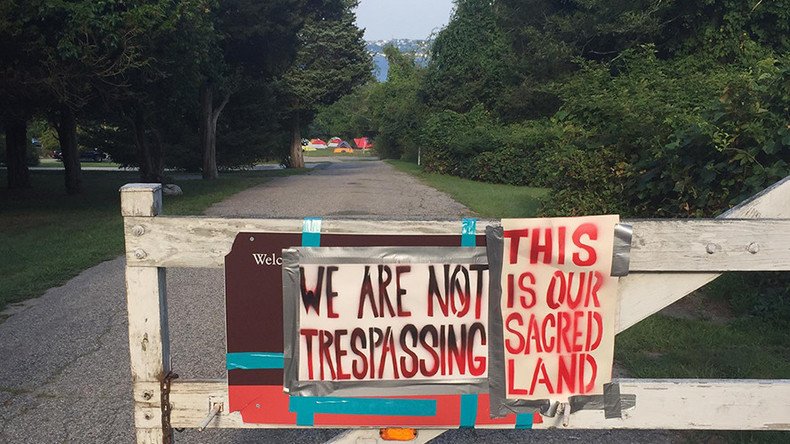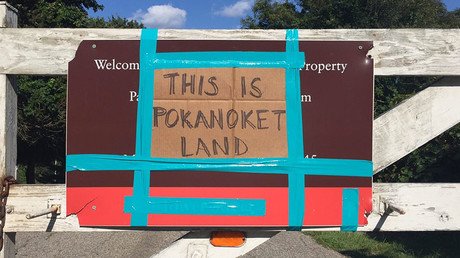Next Standing Rock? Pokanoket Nation in bid to reclaim land in Rhode Island

A Native American tribe has set up an encampment on a mountain in Rhode Island, seeking to reclaim ancestral land from Brown University. The Pokanoket Nation says that Brown obtained the land improperly. The Ivy League school disagrees.
Five days ago, 50 to 70 members of the Pokanoket, who are not a federally recognized tribe, built an encampment at Potumtuk in Bristol, Rhode Island, claiming the right of tribal trust. The land they consider sacred was stolen from them during colonial warfare over 300 years ago, they say.
“We are not here trying to get over on anyone. We are saying we understand the law, we are operating in the proper capacity, we are capable of administrating and overseeing ourselves and our ancestors’ land and we have taken them into trust,” Neesu Wushuwunoag (Two Hawks) of the Mashapaug Nahaganset tribe and director-general of the Aboriginal Nations of America, explained to RT.
"Members of Pokanoket tribe, supporters occupy Brown University land in Bristol." Brown doesn't have a valid deed? https://t.co/FV01IH6vix
— Blue Corn Comics (@bluecorncomics) August 22, 2017
In January 2016, the Pokanoket filed for an Aboriginal Title over the land, as they want it brought back under the tribe’s stewardship. Notices were filed with the federal government and by Brown University, but the tribe did not receive a response within the allotted 30 days of filing. They also filed a lawsuit against the town of Bristol and the state of Rhode Island, and recorded a Public and Constructive Notice with the town of Bristol.
Wushuwunoag said this would have given Brown University a chance to make a superior claim or rebut the claim during the 30-day period. No one has responded yet.
Pokanoket tribe occupying Mount Hope land in Bristol. https://t.co/1RzlDWrTBdpic.twitter.com/nr2GDfTSF4
— eastbayri.com (@eastbayri) August 21, 2017
The tribe also met with representatives from the Rhode Island governor’s office and the attorney general. After the meeting, both parties stopped communicating with the tribe, according to Wushuwunoag.
Last year, the tribe had a repatriation ceremony at Potumtuk and raised the Pokanoket flag declaring their right to the land. Brown University officials took it down.
“To take down a nation’s flag is a sign of war,” Wushuwunoag told RT. “These are intelligent individuals, these are successful individuals, they know they law and they know what they are doing, and with that there was no further communication.”
For several years the Pokanoket have participated in Camp Wetu, a summer program run by Brown University on Mount Hope, Wushuwunoag said.
Sagamore Po Wauipi Neimpaug (William Guy), a chief of chiefs descended from Po Metacomet (also known as "King Philip"), has taught children about the tribe’s cultural traditions, history and experiences during colonialism.
It was the Pokanoket who first welcomed Puritan colonists to the continent, but later fought what became known as Metacomet’s War (King Philip’s War), in which they were eventually defeated. Metacomet was killed by colonists at Potumtuk, where his body was quartered.
Representatives from Brown University visited the encampment on Tuesday and said they would not be willing to turn over the land, but would be willing to give the tribe free access.
“Our focus was to listen and become knowledgeable about the Pokanoket Nation’s position. We also discussed Brown’s access to the land for our academic activities," Brown University said in a statement following Tuesday’s meeting. "This was the beginning of a conversation that we expect to continue as we work toward a resolution. We are open to engaging in sustained conversations about ensuring the best long-term solution for access for all the Indigenous Nations in this area.”
Brown should be discussing what they are going to pay the tribe for using the land, having buildings on the land, and running classes there, Wushuwunoag said.
During the meeting, Sagamore William told the school representatives that the land was not theirs, but “our land by blood line, by paperwork and trust, and by the mere fact we are now on it,” according to Wushuwunoag.
If Brown University continues to say it can’t turn over the land, then “let’s settle in court,” the tribe's spokesman said.
“We would be more than happy to go to a court of law and take a look from a lawful standpoint of who has the superior claim to this land. It is quite obvious it is us, and they haven’t rebutted anything on paper or in conversation,” Wushuwunoag said.
The 375-acre (152-hectare) property is located about half an hour's drive from the university campus in Providence. Brown officials said the land had been donated in parcels over a period of years, beginning in the 1950s.
By Rebecca Myles @RebMyles













